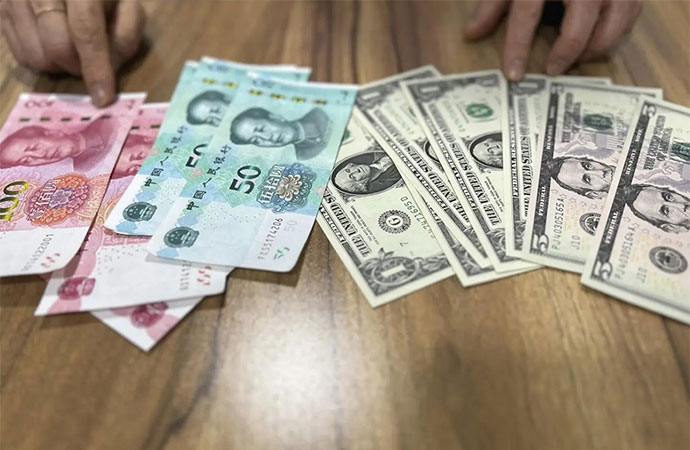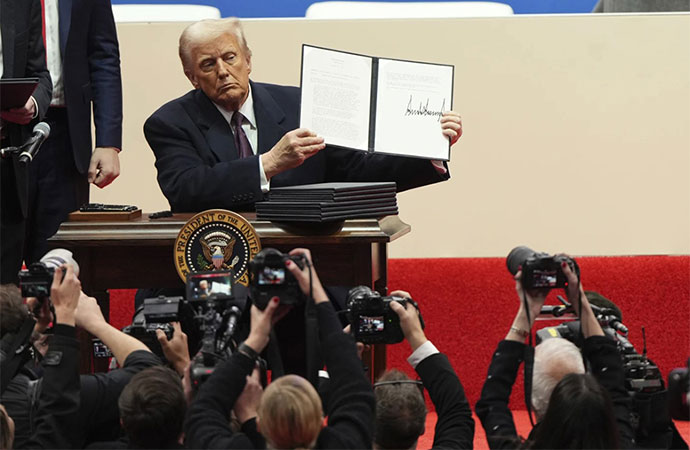Business

Photo: AP/UNB
Will the China hawks in Donald Trump’s administration railroad him into a confrontation that transcends tariffs and embraces financial sanctions of the type the US and the European Union imposed on Russia? If they do, China's leaders will have to decide whether to decouple from the dollar-based international monetary system.
With Donald Trump back in the White House, the high tariffs he has pledged to slap on Chinese imports are not China's greatest concern. China's leaders understand that tariffs are more significant for Trump as political and symbolic moves than as economic weapons that will seriously impede China's growth and development.
The real dilemma facing China centers on whether or not to decouple its economy from the dollar-dominated international monetary system by turning the BRICS group of major emerging economies into a Bretton-Woods-type arrangement. The answer will depend not on tariffs or the fate of TikTok but on whether the China hawks in Trump's administration railroad him into a confrontation that transcends tariffs and embraces financial sanctions.
Tariffs are overrated as a weapon to subdue China, especially when they are combined with promises of large tax cuts and radical deregulation at home. After all, both moves are likely to raise US profits and share prices, accelerating the influx of foreign capital into the US. While the federal budget deficit will grow, the dollar will continue to strengthen - and mitigate the negative effect of tariffs on Chinese exports - so long as investors believe that the rise in the yield of US Treasuries will not overshadow the rise in US stock indices. The gap between domestic savings and investment - the root cause of the US trade deficit vis-à-vis China and Europe - will widen.
Trump is facing a difficult trilemma: Can he combine high tariffs, a weaker dollar, and the greenback's continued global hegemony? Having studied the 1985 Plaza Accord carefully, Chinese leaders anticipate that Trump will try to do to them what Ronald Reagan did to the Japanese 40 years ago. In other words, China can choose its poison: a massive appreciation of the renminbi or massive tariffs on Chinese imports. But this brings us to the political and geostrategic dimension of the problem.
Trump understands that China is not Japan, whose postwar Constitution was written by US officials and a country where 55,000 US military personnel are stationed. Moreover, China is no longer as dependent on the US market as it used to be, having diversified and made its products and fully-owned supply chains indispensable worldwide.
The chance that China will roll over and accept sharp renminbi appreciation to avoid Trump's tariffs is vanishingly small, to put it mildly. Chinese officials know very well that the revaluation of the yen under the Plaza Accord was instrumental in permanently derailing Japan's industrial and financial ascendancy.
Still, even if Trump knows that China will not acquiesce by revaluing the renminbi to avoid his high tariffs, he will still impose them for political and symbolic reasons. Then, a negotiation will commence and a compromise, involving slightly lower tariffs, will be struck.
As James K. Galbraith predicts, the impact of these tariffs on Chinese manufacturers will be modest as world trade recalibrates, with the US buying more from Vietnam and India while Chinese exports to Europe and the rest of the world skyrocket. If there is one economic bloc that will suffer massive economic losses as a result of Trump's tariffs, it is the European Union - not China.
Likewise, the ever-higher digital-technology wall between China and the US is already benefiting large companies in both countries. In China, hordes of engineers are already making enormous strides in manufacturing advanced microchips that China would never have produced without the New Cold War that Trump started during his first term - a policy that former President Joe Biden maintained, and even escalated.
Meanwhile, America's combination of concentrated cloud capital, strength in digital research and development, and Trump's tariffs has already motivated European firms to redirect their investment funding to the US. In short, Europe, not China, has cause to despair at the prospect of Trump's tariffs.
This is not to say that China has no reasons to fret. The big question is whether the US China hawks will be placated enough by high tariffs and anti-Chinese bombast or whether, as is likely, their bellicosity will develop a self-propelling dynamic. More precisely, will they convince Trump to move from mere import tariffs to the type of financial sanctions that the US and the EU imposed on Russia?
If they do, the Chinese government will need to resolve its great dilemma sooner rather than later. Should it pre-empt financial sanctions by seeking to turn the BRICS (Brazil, Russia, India, China, South Africa, and five new members) into a Bretton-Woods-like monetary system, with the renminbi at its heart and the Chinese trade surplus as its backstop? Or should it remain within the broader dollar system and play for time until the US internal contradictions play out?
So far, China has kept the brakes on. While developing various payment systems, it is not pushing the BRICS to evolve into a monetary system. BRICS Pay, for example, is a fascinating experiment in combining blockchain technology with cross-border central planning to create a payments system that ends the West's monopoly on wire transfers. But, as all payments are still denominated in different currencies lacking a common backstop, BRICS Pay is as close to being a monetary system as the dominant SWIFT interbank payments system is to mimicking the eurozone.
To turn the BRICS into a serious challenger of the dollar-based international monetary system, China would have to make its surpluses available to the BRICS so that the rupees Russia receives for its oil exports to India can be exchanged at a quasi-fixed rate for renminbi to be spent on Chinese goods - pretty much what the US did in the 1950s and 1960s to backstop the Bretton Woods system.
This would be a giant step for China to take and a serious challenge to the dollar's dominance. Whether China will take it will depend on geopolitics, not economics.
From Project Syndicate

























Leave a Comment
Recent Posts
Populism strikes again
So it is official now - the Bangladesh national team will not be trave ...
Beijing urges Washington to fo ...
China on Thursday reacted to China-related remarks by the US Ambassado ...
The European Union and the Mercosur bloc of South Am ..
New US Ambassador to Bangladesh raises concern over ..
Gold prices in Bangladesh surged past the Tk 250,000 ..
What is Trump's 'Board of Peace' and who will govern ..